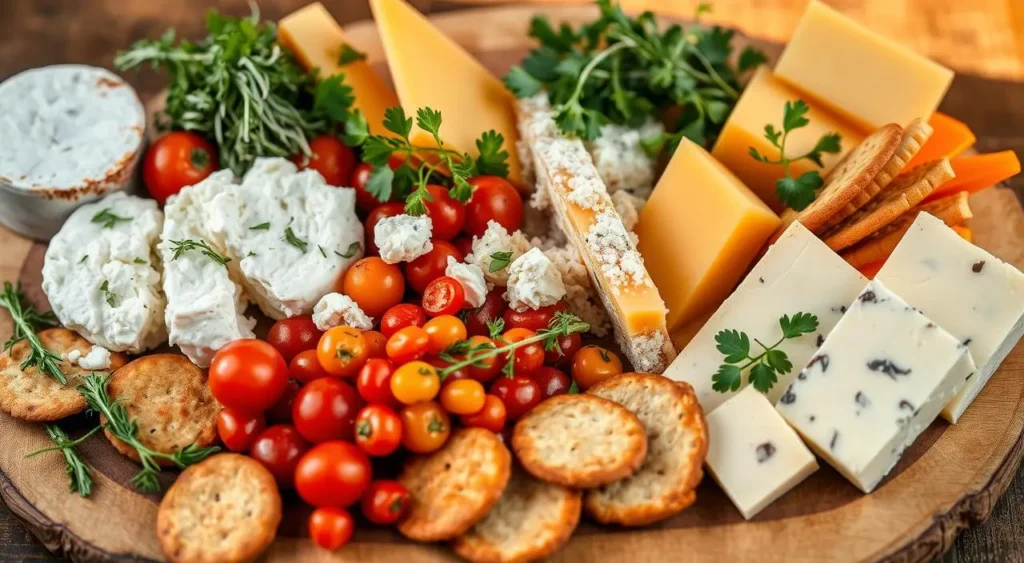Did you know 90% of the world’s cheese uses animal rennet? This coagulant comes from the stomach lining of young animals. But, more people want vegetarian and ethical food choices. This guide will show you cheeses without animal rennet, for different diets and the planet.
Key Takeaways
- Discover the extensive range of vegetarian and rennet-free cheese options available in the United States.
- Understand the traditional sources, ethical considerations, and impact of animal rennet on vegetarian diets.
- Explore plant-based and microbial rennet alternatives transforming the modern cheese-making industry.
- Learn how to identify rennet-free cheeses at the store through label reading and certifications.
- Dive into the world of soft and hard cheeses made with vegetarian rennet, including popular brands and artisanal selections.
Understanding Animal Rennet in Cheese Making
Cheese making has evolved over centuries, with animal rennet being key. It comes from the stomach lining of young ruminant animals. This enzyme is vital for turning milk into solid curds, the base of cheese.
Traditional Sources of Animal Rennet
For a long time, calves, lambs, and kids were the main sources of animal rennet. These young animals’ stomachs were used to coagulate milk. This process effectively separates milk solids from whey.
The Ethical Considerations
Animal rennet’s use raises ethical questions, especially for those on a vegetarian-friendly cheese diet. The need to kill young animals for rennet has led to debates. It questions the ethics and sustainability of traditional cheese making.

Impact on Vegetarian Diets
Vegetarians face a big challenge with animal rennet in cheese. It makes many cheeses off-limits. This has led to a search for plant-based rennet alternatives. These alternatives aim to make vegetarian-friendly cheese without animal products.
“The use of animal rennet in cheese making is a contentious issue, with many consumers seeking more ethical and sustainable alternatives that align with their dietary preferences.”
What Cheese Has No Animal Rennet: Your Complete List
If you’re looking for vegetarian cheese options or rennet-free cheese varieties, you’re in luck. There’s a wide range of tasty choices out there. From soft and creamy to aged and firm, vegetarian cheese is a flavorful alternative for those avoiding animal-derived rennet.
Some popular rennet-free cheese options include:
- Brie and Camembert-style cheeses made with vegetable or microbial rennet
- Soft goat cheeses, often labeled as “vegetarian“
- Hard cheeses like Parmesan, Pecorino, and Manchego produced with plant-based or fermentation-derived rennet
- Artisanal vegetarian cheese varieties crafted by small-scale cheesemakers
Many big cheese brands now offer rennet-free cheese options. This meets the growing demand for vegetarian cheese products. By checking labels and asking your local cheesemonger, you can find and enjoy many delicious vegetarian cheese choices.
“The world of vegetarian cheese is incredibly diverse. Innovative producers are always adding new options for those looking for alternatives to animal-derived rennet.”
Plant-Based Rennet Alternatives in Modern Cheese Making
The cheese industry is now offering plant-based rennet options. This meets the growing demand for vegetarian and vegan choices. These alternatives are just as good as traditional rennet, ensuring high-quality cheese.
Vegetable Rennet Sources
Vegetable rennet comes from plants like thistle, globe artichoke, and safflower. These plants have enzymes that coagulate milk like animal rennet. This makes them a great choice for vegetarian cheese production without losing flavor or texture.
Microbial Rennet Technology
Microbial rennet technology is a big step forward. It uses microbes to make coagulating enzymes. This method is reliable and can be scaled up, making it a favorite among cheese makers.
Fermentation-Produced Chymosin
Fermentation-produced chymosin is a new way to make plant-based rennet. It involves fermenting microbes to create chymosin, the enzyme found in animal rennet. This product is just as good as traditional rennet, making it perfect for vegetarian cheese production.

These new rennet options have changed the cheese world. They offer a variety of tasty and sustainable cheese choices for vegetarians, vegans, and health-conscious eaters.
Popular Vegetarian Cheese Brands and Products
The demand for vegetarian and plant-based diets is on the rise. The cheese industry has responded with more vegetarian cheese brands and rennet-free products. These options meet the needs of those who want dairy alternatives that fit their ethical and dietary choices.
Daiya is a well-known brand in the vegetarian cheese market. This Canadian company is famous for its plant-based cheeses made from coconut oil and tapioca starch. People love Daiya for its melting and stretching abilities, perfect for vegetarian pizzas, sandwiches, and mac and cheese.
Follow Your Heart is another big name in vegetarian cheese. Based in California, they offer a variety of rennet-free cheeses, including blocks, shreds, and spreads. Their Vegenaise line is a favorite among vegetarians and vegans, and their Melty Slices and Parmesan Style Shreds are loved by cheese enthusiasts.
Miyoko’s Creamery is known for its artisanal approach. They make their products from cultured cashews, offering flavors and textures that compare to dairy cheeses. Their Organic Mozz and Cultured Vegan Butter are especially popular.
| Vegetarian Cheese Brand | Notable Products |
|---|---|
| Daiya | Shredded Cheese, Slices, Cream Cheese |
| Follow Your Heart | Vegenaise, Melty Slices, Parmesan Style Shreds |
| Miyoko’s Creamery | Organic Mozz, Cultured Vegan Butter |
These are just a few of the many vegetarian cheese brands and rennet-free products available. As the plant-based movement grows, we can expect more diverse and innovative vegetarian cheese options in the future.
How to Identify Rennet-Free Cheese at the Store
Finding vegetarian cheese can be a bit tricky. But, with the right knowledge, you can spot rennet-free options at the store. Just look closely at cheese labels and check for specific certifications that show the cheese is vegetarian.
Reading Cheese Labels
When looking for vegetarian cheese, check the ingredient list carefully. Stay away from cheeses that say “animal rennet” or just “rennet.” These usually come from animal stomachs. Instead, look for cheeses that use plant-based rennet, like microbial or vegetable rennet.

Common Certification Symbols
- Vegetarian Society Approved
- Certified Vegetarian
- Suitable for Vegetarians
- Rennet-Free
Questions to Ask Your Cheesemonger
If you’re not sure about a cheese’s rennet source, ask your cheesemonger. They know a lot about cheese-making and can tell you about the rennet used. They might also suggest rennet-free cheeses that fit your diet.
By learning about cheese labels, certifications, and talking to your cheesemonger, you can find rennet-free cheese easily. This way, you can make choices that fit your vegetarian lifestyle.
Soft Cheeses Without Animal Rennet
For those who follow a vegetarian lifestyle or prefer animal-friendly cheese, there’s a wide range of vegetarian soft cheese options. These rennet-free soft cheese varieties use new methods to avoid animal-derived rennet. This makes them a kind choice without losing taste or texture.
Vegetarian mozzarella is a favorite, found in many stores. It’s soft and stretchy, great for pizzas, salads, and more. Vegetarian ricotta is creamy and smooth, perfect for lasagna, stuffed shells, and desserts.
Vegetarian cream cheese is also popular. It’s used as a spread, dip, or in baking. These cheeses are made with plant-based coagulants, offering a rich taste without animal rennet.
Exploring vegetarian soft cheese opens up new flavors and textures. These rennet-free soft cheese varieties let you enjoy dairy without harming animals or the environment. Discover the delicious world of vegetarian soft cheese and savor every bite.
Hard Cheeses Made With Vegetarian Rennet
Vegetarians and those looking for animal-free cheese have a lot to choose from. The selection of vegetarian hard cheese and rennet-free aged cheese is vast. These cheeses have the same rich flavors and textures as traditional ones, but without animal-derived rennet.
Aged Options
Aging is key for hard cheeses, and vegetarian rennet-based options are no different. These rennet-free aged cheese varieties are carefully aged to develop their complex flavors and firm textures. You can find everything from sharp cheddars to nutty Parmesan-style cheeses.
Popular Varieties
- Cheddar: Vegetarian cheddar cheese has the same tangy taste as traditional cheddar. It’s firm and perfect for slicing.
- Parmesan: Vegetarian Parmesan cheeses have the same aged, umami-rich flavor and granular texture as the real thing.
- Swiss: Vegetarian Swiss cheese tastes nutty and slightly sweet. It has a supple texture that’s a bit open.
Artisanal Selections
For a gourmet experience, try artisanal vegetarian hard cheese. These cheeses are made by skilled cheesemakers using innovative methods. They offer complex flavors, unique textures, and a level of sophistication that rivals traditional cheeses.
| Vegetarian Hard Cheese Variety | Flavor Profile | Texture |
|---|---|---|
| Aged Cheddar | Sharp, tangy, slightly nutty | Firm, crumbly |
| Vegetarian Parmesan | Umami-rich, aged, slightly sweet | Granular, hard |
| Artisanal Swiss | Nutty, slightly sweet | Supple, slightly open |
Whether you’re looking for classic flavors or unique artisanal cheeses, there’s a lot to explore. The world of vegetarian hard cheese and rennet-free aged cheese offers delicious and ethical choices.
International Vegetarian Cheese Options
The demand for global vegetarian cheese and international rennet-free cheese is rising. Cheese lovers worldwide are discovering new flavors and traditions. There’s a wide range of vegetarian cheeses to explore beyond the United States.
In Europe, artisanal cheeses are a highlight. Italy’s Vegan Gorgonzola is creamy and blue-veined. Spain’s Queso de Cabra sin Cuajo is tangy and goat-based. The UK’s Godminster Organic Cheddar is a Cheddar-style cheese made with vegetable rennet.
Asia is also a hub for vegetarian cheese innovation. Japan’s Daiya Cheese is a soy-based favorite for cooking and snacking. India’s Paneer cheese, often made without animal rennet, is great for vegetarian dishes.
| Country | Vegetarian Cheese Variety | Key Characteristics |
|---|---|---|
| Italy | Vegan Gorgonzola | Creamy, blue-veined texture |
| Spain | Queso de Cabra sin Cuajo | Tangy, goat-based alternative |
| United Kingdom | Godminster Organic Cheddar | Award-winning Cheddar-style cheese |
| Japan | Daiya Cheese | Versatile soy-based brand |
| India | Paneer | Firm, fresh option for vegetarian dishes |
Traveling through Europe, Asia, or India, you’ll discover a world of vegetarian cheese. It’s a journey filled with diverse and delicious flavors for cheese lovers.
Making Rennet-Free Cheese at Home
Curious about making your own vegetarian cheese at home? It’s a fun and tasty project. We’ll guide you on how to make DIY rennet-free cheese in your kitchen.
Basic Recipes
There are many ways to make homemade vegetarian cheese. You can use plant-based rennet alternatives like:
- Cashew Cheese: Mix soaked cashews, lemon juice, and seasonings for a creamy cheese.
- Almond Ricotta: Blend blanched almonds, plant-based milk, and herbs for a ricotta-like cheese.
- Coconut Milk Mozzarella: Use coconut milk, agar-agar, and salt to make mozzarella-style cheese.
Required Equipment
You’ll need simple equipment to make homemade vegetarian cheese. Here’s what you’ll need:
- High-powered blender or food processor
- Cheesecloth or nut milk bag
- Cheese molds or containers
- Thermometer (for temperature control)
- Aging container or refrigerator (for hard cheeses)
Tips for Success
Here are some tips to help you make great homemade vegetarian cheese:
- Soak nuts or seeds overnight for creamier cheese.
- Try different plant-based milks for different textures and flavors.
- Play with seasonings and aging times to find your favorite.
- Keep the right temperature and humidity for aging hard cheeses.
With a bit of effort, you can become a pro at making vegetarian cheese at home. Enjoy making your own unique, plant-based cheese creations.
Common Myths About Vegetarian Cheese
As more people look for vegetarian cheese, myths about its taste, texture, and health benefits are common. Let’s clear up some of the most widespread rennet-free cheese facts you need to know.
Myth: Vegetarian Cheese Tastes Inferior
This is not true. Thanks to new plant-based and microbial rennet technologies, cheese makers can now create vegetarian cheese that tastes just as good as the traditional kind. Many top cheeses are now made without animal rennet.
Myth: Vegetarian Cheese Has a Poor Texture
The texture of rennet-free cheese might be a bit different, but it’s often just as creamy, firm, or crumbly. Cheese makers have learned how to get the right texture using different coagulants.
Myth: Vegetarian Cheese is Nutritionally Inferior
Most vegetarian cheese products have the same nutrients as traditional cheese. They have protein, calcium, and vitamins. The only difference is they don’t have animal-derived rennet. This doesn’t change their nutritional value.
“The quality and taste of vegetarian cheese have gotten much better in recent years. It’s now a great choice for those wanting to eat less animal products.”
By debunking these myths, you can confidently add more rennet-free cheese to your diet. You’ll find a wide range of flavors and textures to enjoy.
Conclusion
The world of vegetarian cheese is vast and varied. You can find everything from soft to hard, aged to fresh cheeses. These options are perfect for those who follow a plant-based diet or want to eat less animal products.
There are many choices available, from artisanal cheeses to well-known brands. This makes it easy to find cheeses that match your values. By checking labels and asking cheesemongers, you can make smart choices.
Exploring vegetarian cheese is a fun journey. It lets you try new flavors and textures. Enjoy the wide range of vegetarian cheese options and rennet-free alternatives out there. It’s a delicious and ethical way to enjoy cheese.
FAQ
What cheese has no animal rennet?
Many cheeses don’t use animal rennet, making them good for vegetarians and those who care about animal welfare. Soft cheeses like mozzarella and ricotta are examples. Hard cheeses like cheddar and Parmesan also have plant-based or microbial rennet alternatives.
How can I identify vegetarian cheese at the store?
Look for “vegetarian” or “rennet-free” labels to find cheese without animal rennet. Check the ingredients for plant-based coagulants. You can also ask a cheesemonger for vegetarian cheese suggestions.
What are some popular vegetarian cheese brands and products?
Brands like Daiya, Treeline, and Miyoko’s offer a variety of vegetarian cheeses. They have soft and hard cheeses, as well as shredded and sliced options. These brands meet the growing demand for plant-based and ethical cheese.
Can I make vegetarian cheese at home?
Yes, you can make vegetarian cheese at home. Use vegetable rennet, microbial rennet, or lemon juice as coagulants. This way, you control the ingredients and the making process.
What are some common myths about vegetarian cheese?
Some think vegetarian cheese tastes worse or has less texture than traditional cheese. But, many vegetarian cheeses now offer great flavors and textures. Also, some believe vegetarian cheese is less nutritious. However, plant-based rennet alternatives can keep the cheese’s nutritional value.

